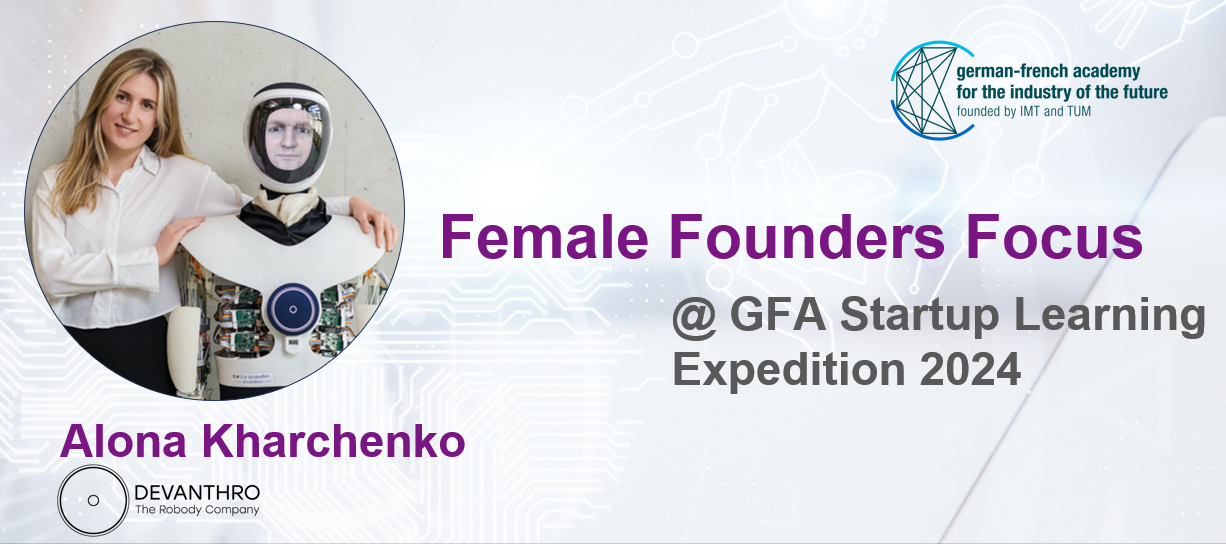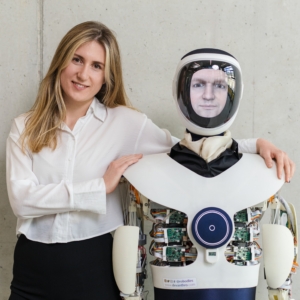GFA: Can you shortly present your start-up and what inspired you to start it?
AK: At Devanthro, we are addressing one of the most pressing societal challenges of today – the global elderly care crisis. Our mission is to help people age with dignity in the comfort of their home and in caring company. To achieve this, we are developing Robody Cares — a telecare platform for home care services, where caregivers remotely control humanoid robotic avatars with immersive VR headsets.
Our vision is to superpower caregivers through our telepresence and telemanipulation technology, enabling them to provide 24/7 care for the elderly. By essentially teleporting their senses, actions, and presence into Robody avatars, caregivers can offer immediate and effective support and physical assistance from anywhere on the planet.
GFA: Can you tell us about your journey as a female founder? What inspired you to start your own venture?
AK: My adventure began when I moved from Ukraine to Germany in 2014 with the goal to work on cutting-edge technology, supported by a DAAD scholarship for my Master’s studies. Originally, my intention was to pursue a PhD, as stated in my scholarship motivation letter. However, things did not go as planned.
In 2015, I met Rafael Hostettler, a PhD student in robotics at TUM at the time, whose goal was to build robots as good as the human body. It captivated me and I decided to join his quest: initially as his student, later as his employee, and ultimately as his co-founder.
We took an unusual approach in robotics and brought our robots out of the lab very early on. This approach led to tens of thousands of interactions of our robots with the general public in the real world, which were overwhelmingly positive and helped us build robots people love.
From the outset, I recognized the significant potential of this technology to positively impact society. Driven by the desire to bring it into millions of homes, launching a venture was the key to making this vision a reality.
GFA: Have you faced any specific obstacles as a female founder and woman in the tech industry, and how did you overcome them?
AK: Quite the opposite – I was encouraged exactly because I was female, a founder and an engineer. I think today, especially for the young generation, a lot of doors (and minds) are opening up and it’s the best time ever to be a female founder.
“Adversity builds character. Facing hardship and learning how to overcome it makes us stronger.”
~ Alona
GFA: Can you share a significant milestone or accomplishment that you are particularly proud of as a female founder?
AK: Absolutely, I’m very excited to share a significant milestone that particularly stands out. In March 2024 we reached a major milestone – successfully completing our first multi-day pilot. Over three days, Robody lived with “Ms. Smith”, an 89-year-old resident, in her home in Pirmasens, a small German town.
Here’s why it is big:
- Smith loved Robody – reinforcing our prior empirical results that showed Robody acceptance rates over 85% among elderlies
- Robody was not just loved, but also useful: we covered a wide range of activities through Robody – facilitating physical and cognitive activation exercises, planning and maintaining day structure, bringing water and reminding to drink, accompanying during lunch and even hanging up laundry together
- Our robot worked safely and reliably in a highly unstructured and previously unknown environment of Ms. Smith’s flat – it navigated narrow corridors of the flat, drove over rugs often layered on top of each other and manipulated objects of daily use. This is only possible through teleoperation – another point to strengthen our approach.
- The care staff and management at Diakoniezentrum Pirmasens, our piloting partner, gave overwhelmingly positive feedback. Their readiness to host the next longer pilot is a solid demonstration of commercial interest in Robody Cares.
GFA: Have you found any particular resources or support networks that have been helpful to you as a female founder?
AK: Not exclusive to female founders only, but here’s a list of those I found useful, as a deep tech founder:
- AI+Munich – 25k equity-free grant to build your prototype
- ESA BIC Incubator – 50k equity-free grant for your product development + access to expert networks
- UnternehmerTUM ecosystem offering a great network, facilities and programs for young startups, including TUM Venture Lab and Women Start-Up
- Deep Tech Momentum – a 3-day bootcamp for deep tech founders organized by Techstars – a great place to get facetime with VCs and advisors.
GFA: What lessons have you learned from your failures or setbacks as a female founder?
AK: Adversity builds character. Facing hardship and learning how to overcome it makes us stronger. On February 24, 2022, as Kyiv was attacked by Russians, we brought Robody to a care residence to show it to elderlies for the first time ever. That day was a surreal experience – on one hand, I witnessed the elderly connect with Robody in a moment of pure magic, and on the other, I was in parallel planning the escape of my sister out from Ukraine away from Russian bombings. At that time, Devanthro was a 3-people company and we just started to reach out to the first potential investors for the fundraise. The next two months I spent volunteering pretty much full-time, coming in only late night to the office to finish the robot we just sold to the Oxford University, while having at home two 20-year Ukrainian girls who could not function in Germany without me. I wrestled with guilt and moral dilemmas about how to use my time — caring for family vs helping people suffering in Ukraine vs building my company. However, navigating these challenges proved crucial in helping me understand myself, my values and priorities better, ultimately giving the strength and clarity I carry forward today.







